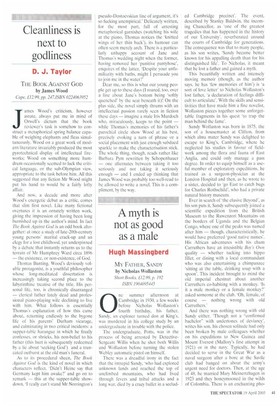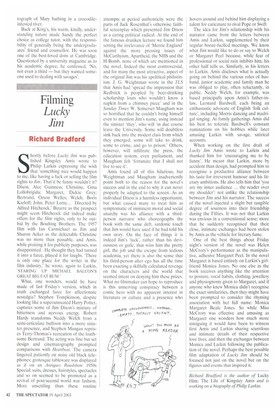A myth is not as good as a male
Hugh Massingberd
MY FATHER, SANDY by Nicholas Wollaston Short Books, £12.99, p. 192 ISBN 1904095445 0 ne summer afternoon at Cambridge in 1930, a few weeks before Nicholas Wollaston's fourth birthday, his father, Sandy, an explorer turned don at King's, was murdered in his college study by an undergraduate in trouble with the police.
The undergraduate, Potts, was in the process of being arrested by DetectiveSergeant Willis when he shot both Willis and Wollaston before turning the stolen Webley automatic pistol on himself.
There was a dreadful irony in the fact that the intrepid Sandy, who had explored unknown lands and reached the top of unclimbed mountains, who had lived through fevers and tribal attacks and a long war, died by a crazy bullet in a seclud
ed Cambridge precinct'. The event, described by Stanley Baldwin, the incoming Chancellor, as 'one of the greatest tragedies that has happened in the history of our University', reverberated around the courts of Cambridge for generations. The consequence was that to many people, as his son writes, 'Sandy became better known for his appalling death than for his distinguished life'. To Nicholas, it meant that he lost a father and gained a myth.
This beautifully written and intensely moving memoir (though, as the author says, he has 'few memories of him') is 'a sort of love letter' to Nicholas Wollaston's lost father, 'a declaration of feelings difficult to articulate'. With the skills and sensitivities that have made him a fine novelist, Wollaston pieces together some unforgettable fragments in his quest 'to trap the man behind the fame'.
Sandy Wollaston was born in 1875, the son of a housemaster at Clifton, from which alma mater Sandy was delighted to escape to King's, Cambridge, where he neglected his studies in favour of fieldwork among the flora and fauna of East Anglia, and could only manage a pass degree. In order to equip himself as a useful member of exploratory expeditions, he trained as a surgeon-physician at the London Hospital and then, as he wrote to a sister, decided to 'go East to catch bugs for Charles Rothschild', who had a private natural history museum.
Ever in search of 'the elusive Beyond', as his son puts it, Sandy subsequently joined a scientific expedition from the British Museum to the Ruwenzori Mountains on the borders of Uganda and the Belgian Congo, where one of the peaks was named after him — though, characteristically, he would have preferred 'good native names'. His African adventures with his chum Carruthers have an irresistible Boy's Own quality — whether tucking into hippo fillet, or dining with a local commandant who was also entertaining a chimpanzee 'sitting at the table, drinking soup with a spoon'. This incident brought to mind the old imperial chestnut about another Carruthers co-habiting with a monkey. 'Is it a male monkey or a female monkey?' asked someone at the club. 'Oh, female, of course — nothing wrong with old Carruthers.'
And there was nothing wrong with old Sandy either. 'Though not a "confirmed bachelor" with undertones of deviancy', writes his son, his chosen solitude had only been broken by male colleagues whether on his expeditions to New Guinea and Mount Everest (Mallory's first attempt in 1921) or in the navy. Typically, he had decided to serve in the Great War as a naval surgeon after a bore at the Savile club had banged on about the army's urgent need for doctors. Then, at the age of 48, he married Mary Meinertzhagen in 1923 and they honeymooned in the wilds of Colombia. There is an enchanting pho tograph of Mary bathing in a crocodileinfested river.
Back at King's, his warm, kindly, understanding nature made Sandy the perfect choice as college tutor, with the responsibility of generally being the undergraduates' friend and counsellor. He was soon one of the best-loved dons at Cambridge. Questioned by a university magazine as to his academic degree, he confessed, 'No, not even a third — but they wanted someone used to dealing with savages'.



































































 Previous page
Previous page